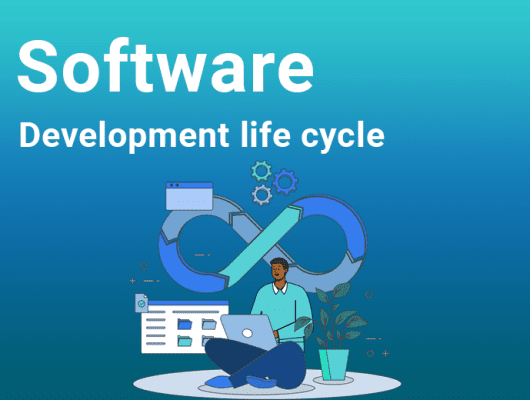
Tailoring Mobile App Solutions For Small Businesses (A User Guide)
As technology is growing day by day, mobile apps are crucial for small businesses to thrive.
But how can small businesses ensure their mobile app stands out in a crowded market?
What features are essential for engaging their target audience effectively? How can they maximize the return on investment in mobile app development?
If you are looking for the answer to these queries, this guide is for you. It highlights the strategies that help SMEs in boosting productivity.
So, without wasting the time, Let’s spill the beans.
Table of Contents
1. Mobile App Development For SMEs?
The term “app development for a small business” describes the process of creating a mobile app that meets the specific requirements of a small company.
This process includes designing, developing, testing, and releasing.
Apart from that, app Development helps Companies of all sizes in
- Enhancing client engagement
- Increasing loyalty and sales
- Simplified internal operations
- Improve overall efficiency.
2. Tips For Mobile App Development For Small Business

The following are optimal approaches to mobile application development for a small enterprise:
2.1. Extensive Research
The first step in developing a mobile application is to determine customers’ needs. So, think carefully about the app’s purpose, intended users, and minimalist layout.
Developers can give their apps the features they need when they clearly know who they’re building the app for.
2.2. Identify Target Audience
Finding your target audience might be an uphill battle if you’re a new or small business owner. To be sure, figuring out who you’re trying to reach simplifies developing a mobile app. To do this,
- Studying your competitor’s app is an excellent way to determine your target audience.
- Understand the features users are struggling with.
- If you want to know what features your competitors’ users prefer, check out their reviews on the App Store or Google Play Store. Then, include those features in your app.
- Evaluate their app needs in light of their platform preferences; create an app that caters to Android, iOS, or both.
- Locate their most active social media and promote your app for better engagement.
2.3. Design Of The App
The next step is crafting a program’s user interface and experience. So, for tailoring software for small business on different mobile devices
- Utilize online tools like Google Docs or paper and pencil to create a high-level strategy for your app.
- Make sure there are interactive elements like graphics, text, and buttons.
- Formulate a procedure that represents your ideal case for the app.
- Try out every single tool and technology that is accessible on the web.
- Find out what your intended users want and address their problems with an app you built.
2.4. Create MVP App
The cost of developing a mobile application for a small business varies depending on the intricacy of the process.
An introductory small company mobile app costs $12,960 to $30,240, while a high-end mobile app costs $82,080.
So, it is beneficial to design a minimum viable product (MVP) first. By doing so, you can gather consumer feedback early in the product development process.
Thus, it helps you to prioritize customer service while cutting costs without compromising quality.
2.5. Choose the Right App Development Company
Identifying the most competent mobile application development company is essential for turning your ideas into reality.
It is preferable to choose an app development company specializing in iOS or Android management systems.
2.6. Testing
Quality assurance is essential at every step because the app development industry is incredibly competitive. This method allows your team to identify and resolve software bugs before delivering it to clients.
If users complain about the app’s slow performance, it may damage your company’s image and stunt its expansion.
So, assign software testing to team members who understand the app’s purpose. Assist them in testing the app by providing the tools they need.
Make sure you have a support team that ensures proper project management.
2.7. App Responsiveness
According to Gitnux, 50% of users abandon mobile applications because of unappealing features or low user engagement.
To avoid this, ensure the user interface is seamless and contains only the essential functions. Your users should be able to download the app without any problems.
Remember that excessive application features can increase size and download duration, irritating users. So, keep your app as simple as possible for better user engagement.
2.8. Optimization Of The App
Release your small business app to the Apple App Store and the Google Play Store to maximize exposure and downloads.
This approach helps you raise your profile and draw in more users, improving the app’s sales and giving you an edge over the competition.
Use terms your target audience uses in their searches to optimize your software for app stores. This will enhance exposure and downloads.
In addition, use appealing icons and animations to boost downloads for your mobile app.
2.9. Ensure App Contribution To Your Brand
Your mobile application can complement your overall marketing strategy by increasing brand recognition and facilitating customer acquisition.
So, maintain cohesion with your online presence by using the same branding elements across all channels. Make sure your app’s name and symbol stand out.
2.10. Monetization Of The App
Monetization means converting an asset into a stream of income.
The success or failure of your application depends on whether the revenue generated is less than the expenditure.
Your business will thrive if the value created by new customers exceeds the cost of acquiring them. As a result, a mobile app can earn money in many ways:
a. Advertisement
Including ads is one of the most significant ways to make money from the app. Numerous app developers present their programs with two alternatives.
- A paid program that does not include advertisements
- A free application with advertisements.
In terms of making money for your company, both choices are excellent.
b. Fees For Transactions
Companies like Airbnb and PayPal provide a platform for certain types of transactions. From each transaction, they generate a profit and collect fees.
c. Premium service
You can make your program available to everyone and even charge for extra features.
When selling a game, you may give players a free episode and make them pay for the rest.
Conversely, you permit users to finish games without fee but charge for access to additional functionalities.
d. App Subscriptions
For software as a service business, subscriptions are the go-to revenue generator. It lets you attract customers to use your software in the long run.
You can determine their monthly fee according to which features they utilize.
2.11. Deployment
Concerning the launch of your application, you have various options at your fingertips.
- Move your application to an active environment, such as the cloud, a web server, or hosting.
- Configure servers and domain names and install security measures like SSL/TLS certificates.
- Implement advanced technologies to ensure the stability of the application, error-tracking, and monitoring.
- Guaranteeing continuous operation.
- Make sure to undergo regular Upkeep and Updates.
2.12. Maintenance and Updates
- Ensure that your application has security patches to prevent data breaches.
- Adapt the functionalities of the application to accommodate heightened user activity and traffic.
- Market and promote the application to attract and engage users.
- Analyze data and gather user feedback to make well-informed decisions regarding future enhancements and updates.
3. Feature To Include In Your Small Business Mobile App
App development can be intimidating when you’re just starting. But know your limits so you can integrate the app’s functionality correctly. So, Take into account these few app features
- Incorporate individual profile system
- Ensure that apps have signup features
- Add images, movies, and GIFs that encourage app downloads.
- The app’s search feature makes locating various types of material, persons, and organizations easy.
- The messaging system allows users to send each other private messages.
Additional Functions
If you want your app to stand out, include these features.
- Use Advanced technology for virtual reality and face recognition
- Utilize AI chatbots to advertise to business clients.
- Integrate live video streaming into your app.
- You may also add features to personalize stories or add short movies.
4. Benefit Of Small Business Mobile Application

App development brings several advantages for small businesses, such as
4.1. Sales Enhancement
When small enterprises engage in application development, they observe significant growth in sales.
The user-friendliness and convenience of a mobile app make it an ideal instrument for increasing revenue. It also facilitates order receipt and payment for customers.
4.2. Brand Recognition
Small business application development contributes to the success of branding initiatives. It establishes a foundation that serves as an extension of your brand.
By utilizing a mobile application, one can enhance the
- Reputation of their business
- Bolster their credibility
- Gain a substantial competitive advantage within their respective industry.
4.3. Enhanced Online Visibility
App development for small businesses can aid in establishing a solid online presence.
A mobile application enhances online visibility and contributes to the brand’s representation in the vast digital realm.
It will maintain the constant visibility of your brand on user displays. Despite its seemingly insignificant purpose, it is a great touchpoint for future conversions.
Additionally, working with top IT service providers to optimize your app for search engines can increase your company’s online presence.
4.4. More Profitable Opportunities
Mobile applications enable you to connect with a more extensive demographic. You can expand your customer base as the number of consumers of your application grows.
According to Business of Apps, nearly 90 billion apps undergo the process of downloading globally.
Therefore, you can expand your market reach and go global.
4.5. Better Client Journey
App development for a small business can assist in fostering a sense of community and belonging among consumers. .
These customizable elements enhance the usability and accessibility of your application and contribute to an exceptional user experience:
4.6. Customer Loyalty
Mobile applications for small businesses reduce the time the customer awaits. They have the ability to peruse your menus and place orders at their leisure.
This will enable you to provide timely responses to their inquiries or requests.
These following features facilitate an enhanced customer experience:
- Organization of goods and services
- System for filtering Sorting icon
- Implementing in-store experience improvements, such as immediate checkout via the app
Find out more about Mobile App Development Fundamentals
Wrapping Up: Mobile App Solutions For Small Businesses
As a result of technological innovation and increased production, applications are becoming an integral part of every endeavor.
To stand out in a crowded marketplace, it is critical to focus on creating useful and novel applications.
Thus, locating a reputable app development firm or developer becomes critical.
To eliminate the headache of finding the best vendor, consider OnyxTec, which builds your app with flawless performance.
Our skilled staff makes your app’s layout and functionality impeccable and user-friendly, boosting its technological strength.
Therefore, to acquire your intuitive application at no additional cost, contact OnyxTec.
FAQ
i. What do you mean by mobile app solution for small businesses?
Mobile application solutions are software applications designed to operate exclusively on smartphones and devices.
ii. What is the type of mobile app development?
Mobile application development comes with three different types
- Hybrid app
- Native app
- Cross-platform app
iii. What is a hybrid mobile application?
Hybrid apps are those that can run on both Android and iOS using a single code. Users can easily download these apps from the Google Play Store or Apple App Store.
iv. What are the two leading mobile app platforms?
The two major platforms for mobile applications are
- IOS application Platform
- Android app platform




